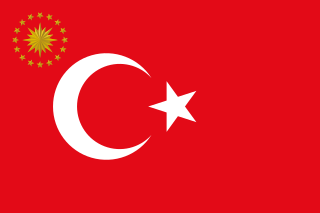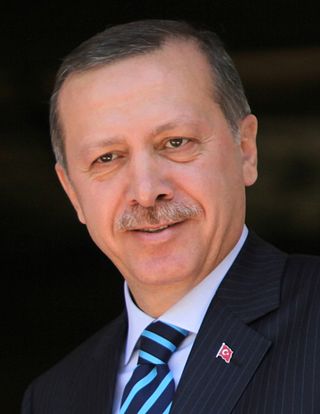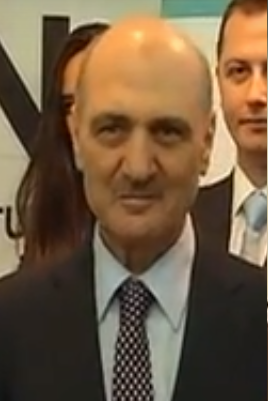
The president of Turkey, officially the president of the Republic of Türkiye, is the head of state and head of government of Turkey. The president directs the executive branch of the national government and is the commander-in-chief of the Turkish military. The president also heads the National Security Council.

Ahmet Davutoğlu is a Turkish academic, politician and former diplomat who served as the 26th Prime Minister of Turkey and Leader of the Justice and Development Party (AKP) from 2014 to 2016. He previously served as Minister of Foreign Affairs from 2009 to 2014 and chief advisor to Prime Minister Recep Tayyip Erdoğan from 2003 to 2009. He was elected as an AKP Member of Parliament for Konya in the 2011 general election and was reelected as an MP in both the June and November 2015 general elections. He resigned as Prime Minister on 22 May 2016.

Ahmed Tevfik Pasha, later Ahmet Tevfik Okday after the Turkish Surname Law of 1934, was an Ottoman statesman of Crimean Tatar origin. He was the last Grand vizier of the Ottoman Empire. He held the office three times, the first in 1909 under Sultan Abdul Hamid II, and from 1918 to 1919 and from 1920 to 1922 under Mehmed VI during the Allied occupation of Istanbul. In addition to his premiership, Ahmet Tevfik was also a diplomat, a member of the Ottoman Senate, and the Minister of Foreign Affairs.

Yaşar Yakış is a Turkish politician. He is a former Foreign Minister, and a former ambassador to the UN Office in Vienna, Egypt, and Saudi Arabia. From 2002 to 2011 he represented Düzce as an MP in the Grand National Assembly of Turkey. He is a member of the Justice and Development Party, the leading political party in Turkey at the moment and he is the chair of the European Union Harmonization Committee of the Grand National Assembly of Turkey. He received the French Légion d'Honneur

Bekir Sami Bey was a Turkish politician of Ossetian origin. He served as the first Minister of Foreign Affairs of Turkey during 1920–1921.

Denmark–Turkey relations are the current and historical relations between Denmark and Turkey. Denmark has an embassy in Ankara, and Turkey has an embassy in Copenhagen. Both countries are members of NATO. Diplomatic relations between Denmark and Turkey were put under pressure in 2014 because of the Jyllands-Posten Muhammad cartoons controversy and the Roj TV affair (Roj TV's broadcasting license was suspended by the Supreme Court in Denmark on February 27, 2014). Denmark is a member of the European Union, Turkey is not a member.

Ethiopian–Turkish relations are foreign relations between Ethiopia and Turkey. Ethiopia has an embassy in Ankara and Turkey has an embassy in Addis Ababa.

Neo-Ottomanism is an irredentist and imperialist Turkish political ideology that, in its broadest sense, advocates to honor the Ottoman past of Turkey and promotes greater political engagement of the Republic of Turkey within regions formerly under the rule of the Ottoman Empire, the predecessor state that covered the territory of modern Turkey among others.
Bekir is a Turkish given name for males which comes from Abu Bakr, the first Caliph of Islam.

The foreign policy of the Recep Tayyip Erdoğan government concerns the policy initiatives made by Turkey towards other states under Prime Minister, Recep Tayyip Erdoğan.

The third cabinet of Recep Tayyip Erdogan was the government of Turkey from 2011 to 2014, during the 24th parliamentary term of the Grand National Assembly of Turkey. The cabinet succeeded the second Erdoğan cabinet following the 2011 Election.

Erdoğan Bayraktar is a Turkish politician. He is the former Minister of Environment and Urban Planning of Turkey under Prime Minister Recep Tayyip Erdoğan's government and member of parliament for Trabzon from the ruling Justice and Development Party (AKP), resigning from both offices on 25 December 2013.

Bosnia and Herzegovina–Turkey relations are the bilateral relations between Bosnia-Herzegovina and Turkey. Bosnia and Herzegovina is a southeast European country, while Turkey is a transcontinental country with a small European part on the Balkan peninsula around Istanbul. Diplomatic relations between the two countries started on 29 August 1992. Bosnia and Herzegovina has one embassy in Ankara and two consulates in Istanbul and Izmir, while Turkey has one embassy in Sarajevo and one consulate in Mostar. The two countries enjoy very warm diplomatic relations, due to historical and cultural ties dating back to the 15th century. There is a large population of Bosniaks in Turkey and a smaller community of Turks in Bosnia and Herzegovina. The Istanbul quarter of Yenibosna is named in honour of the Bosnian community that has settled there since Ottoman times. Reflecting the close ties between the two nations, Bosnians and Turks are free to travel to each other's countries using only their national identification cards, without the need for a passport. Turkey gives full support to Bosnia and Herzegovina's NATO membership.

The First Cabinet of Ahmet Davutoğlu was the 62nd government of the Turkish Republic, which took office on 29 August 2014. It was the fifth majority government to be formed entirely by the Justice and Development Party (AKP) and was headed by its leader and the 26th Prime Minister of Turkey, Ahmet Davutoğlu. The government assumed office during the 24th parliament of Turkey and succeeded Erdoğan's third cabinet. Davutoğlu is the third AKP politician to take office as Prime Minister, after Abdullah Gül (2002–2003) and Recep Tayyip Erdoğan (2003–2014).

The Ministry of European Union Affairs was a ministry of the Turkish government responsible for the accession process between the Republic of Turkey and the European Union. Formed on June 29, 2011 after Prime Minister Recep Tayyip Erdoğan won a third term in the 2011 general election. The Ministry was responsible for co-ordinating negotiations and accession projects throughout the 81 Provinces of Turkey in order to develop relations between Turkey and the European Union. The minister responsible concurrently served as the chief negotiator during the accession process. The Minister concurrently served as the chief negotiator during accession talks with the EU.

Selami Altınok is a Turkish civil servant and politician who served as the Minister of the Interior in the interim election government formed by Prime Minister Ahmet Davutoğlu between 28 August and 17 November 2015. He previously served as the 10th Governor of Aksaray from 2012 to 2014 and was appointed as the General Director of Security in Istanbul on 16 December 2013. He is also a former Kaymakam (sub-governor).

The Chief Negotiator for Turkish Accession to the European Union was the most senior official representing the Republic of Turkey during the country's accession negotiations to the European Union. The position was established on 17 January 2005 by Prime Minister Recep Tayyip Erdoğan. Following the establishment of the Ministry of European Union Affairs on 29 June 2011, the Minister of European Union Affairs was usually appointed concurrently to serve as the Chief Negotiator. The last Chief Negotiator was the EU Affairs Minister Ömer Çelik, in office between 2016–2018.
Martin Erdmann is a German diplomat.

The Third Davutoğlu Cabinet is the 64th government of the Republic of Turkey. The government came into effect after the Justice and Development Party (AKP), led by Prime Minister Ahmet Davutoğlu, won a parliamentary majority of 84 in the November 2015 general election with 317 seats in the Grand National Assembly and 49.5% of the vote.
Serdar Çam is a Turkish bureaucrat who is currently the president of Turkish Cooperation and Coordination Agency since his appointment in 2011.

















